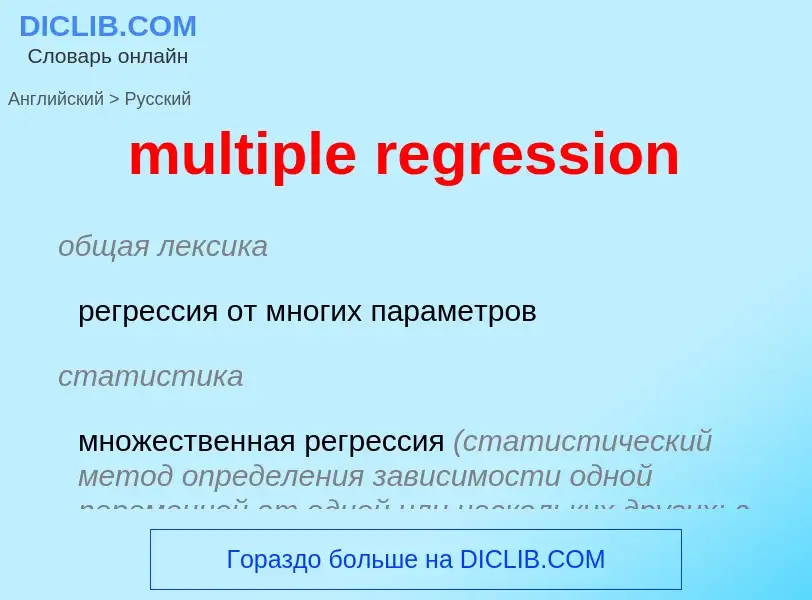Traducción y análisis de palabras por inteligencia artificial ChatGPT
En esta página puede obtener un análisis detallado de una palabra o frase, producido utilizando la mejor tecnología de inteligencia artificial hasta la fecha:
- cómo se usa la palabra
- frecuencia de uso
- se utiliza con más frecuencia en el habla oral o escrita
- opciones de traducción
- ejemplos de uso (varias frases con traducción)
- etimología
multiple regression - traducción al Inglés
общая лексика
регрессия от многих параметров
статистика
множественная регрессия (статистический метод определения зависимости одной переменной от одной или нескольких других; в управленческом учете - объема затрат (а именно переменной составляющей смешанных затрат) и влияющими на него факторами: объемом деятельности, физическими показателями продукции (вес, объем, др.) и т. п.)
Смотрите также
Definición
Wikipedia

In statistics, originally in geostatistics, kriging or Kriging, also known as Gaussian process regression, is a method of interpolation based on Gaussian process governed by prior covariances. Under suitable assumptions of the prior, kriging gives the best linear unbiased prediction (BLUP) at unsampled locations. Interpolating methods based on other criteria such as smoothness (e.g., smoothing spline) may not yield the BLUP. The method is widely used in the domain of spatial analysis and computer experiments. The technique is also known as Wiener–Kolmogorov prediction, after Norbert Wiener and Andrey Kolmogorov.
The theoretical basis for the method was developed by the French mathematician Georges Matheron in 1960, based on the master's thesis of Danie G. Krige, the pioneering plotter of distance-weighted average gold grades at the Witwatersrand reef complex in South Africa. Krige sought to estimate the most likely distribution of gold based on samples from a few boreholes. The English verb is to krige, and the most common noun is kriging; both are often pronounced with a hard "g", following an Anglicized pronunciation of the name "Krige". The word is sometimes capitalized as Kriging in the literature.
Though computationally intensive in its basic formulation, kriging can be scaled to larger problems using various approximation methods.


![Simple kriging can be seen as the mean and envelope of Brownian [[random walk]]s passing through the data points. Simple kriging can be seen as the mean and envelope of Brownian [[random walk]]s passing through the data points.](https://commons.wikimedia.org/wiki/Special:FilePath/Gaussianprocess.gif?width=200)
